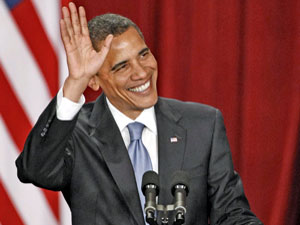WILLIAM.REED -Guest Columnist-
Before he went to Martha’s Vineyard for 10 days at a 1,200-acre, $50,000 a week hobby ranch, President Obama’s three-day tour of the American heartland illustrated his reelection plans and strategy. In the “White Like Me Tour,” Pres. Obama sought to get the attention of population segments disillusioned with him and infuse Middle-American voters with optimism, while convincing them that his approach offers the most rational path to economic stability.

The tour allowed Pres. Obama a picture-perfect platform to strategically define the Republicans as so unwilling to compromise they would risk financial chaos. But, the “White Like Me” tour allowed Pres. Obama to “press the flesh” among America’s heartland, but it brought controversy and discussions about Pres. Obama’s presidential job performance and the policies he supports.
The bus tour had the trappings of a candidate wooing voters. The trip, with all the presidential accessories in tow, took Obama through rural hamlets in Minnesota, Iowa and western Illinois and allowed him to shore up his posture in the polls and his political position with White voters. Pres. Obama went to Henry County, Ill., which has a Black population of 2.2 percent; to Winneshiek County, Iowa which is 0.6 percent African American. In Decorah, Iowa, Obama declared he’d propose a major jobs package to Congress in September.
Pres. Obama’s not delivering for any segments of the American population except the rich. But, a soaring jobless rate among Blacks and a newfound comfort by Black lawmakers to criticize Pres. Obama’s economic policies should prompt White House officials to focus more directly on Black America. Urban Blacks are experiencing 25 percent unemployment and the White House needs more collaboration and cooperation from leaders in Black America. At a jobs forum in Detroit, Rep. Maxine Waters (D-CA.) Waters blasted the president’s bus tour and has asserted that Obama skipped hard-hit African-Americans and their communities. Rep. Waters said “We want to give him every opportunity but…the unemployment is unconscionable.”
The poverty rate in Black Caucus districts is 50 percent higher than the national average. African American joblessness is 16.2 percent, and nearly 41 percent for Black teens. In spite of those numbers, a Washington Post/ABC News poll shows Obama still enjoying rock solid support among Blacks–an 86 percent approval rating for the way he’s handled the economy. Among Whites and independent voters, Obama gets a 26 percent rating.
Waters is right saying: “it’s time for us to step up and note that our communities are not being dealt with and to make sure that this administration understands that we cannot continue to go on this way and … we cannot be quiet. We have decided that not only are we going to remind the administration about the devastation and the pain that we’re experiencing, but we want to be a part of helping to develop the solution. Whatever the plan to be unveiled in September, we intend to be a part of it.”
When will the administration pay attention to Black needs? What will it take for Black people to be a part of Obama’s plans for the nation? Obama need not go further than National Urban League President Marc Morial’s 12-Point Plan for Job Creation. The League’s Plan is based on Urban Jobs Act legislation sponsored by New York Sen. Kirsten Gillibrand and Brooklyn Rep. Edolphus Towns. The Urban Jobs Act provides federal grant funding to non-profit organizations to offer job training, education and support services for urban youth and young adults. Funding Urban Jobs Act programs makes sense. It can help eliminate Black unemployment. The Obama administration needs to fund targeted programs that connect at-risk youth to jobs and gives 18 to 24 year olds skills training, mentoring, and GED preparation.
When President Obama speaks to the nation in September about the labor situation, he’s expected to present new and relevant initiatives to grow the economy and create jobs. It would be gratifying to see Obama present the Urban Jobs Act to the public among his recommendations to put Americans back to work.












